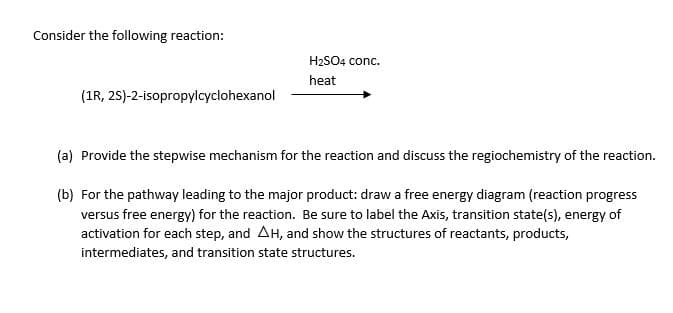Consider the following reaction: (1R, 2S)-2-isopropylcyclohexanol H₂SO4 conc. heat (a) Provide the stepwise mechanism for the reaction and discuss the regiochemistry of the reaction. (b) For the pathway leading to the major product: draw a free energy diagram (reaction progress versus free energy) for the reaction. Be sure to label the Axis, transition state(s), energy of activation for each step, and AH, and show the structures of reactants, products, intermediates, and transition state structures.
Consider the following reaction: (1R, 2S)-2-isopropylcyclohexanol H₂SO4 conc. heat (a) Provide the stepwise mechanism for the reaction and discuss the regiochemistry of the reaction. (b) For the pathway leading to the major product: draw a free energy diagram (reaction progress versus free energy) for the reaction. Be sure to label the Axis, transition state(s), energy of activation for each step, and AH, and show the structures of reactants, products, intermediates, and transition state structures.
Chapter5: Stereochemistry At Tetrahedral Centers
Section5.SE: Something Extra
Problem 70AP
Related questions
Question
please help with the following organic chem question

Transcribed Image Text:Consider the following reaction:
(1R, 2S)-2-isopropylcyclohexanol
H₂SO4 conc.
heat
(a) Provide the stepwise mechanism for the reaction and discuss the regiochemistry of the reaction.
(b) For the pathway leading to the major product: draw a free energy diagram (reaction progress
versus free energy) for the reaction. Be sure to label the Axis, transition state(s), energy of
activation for each step, and AH, and show the structures of reactants, products,
intermediates, and transition state structures.
Expert Solution
This question has been solved!
Explore an expertly crafted, step-by-step solution for a thorough understanding of key concepts.
This is a popular solution!
Trending now
This is a popular solution!
Step by step
Solved in 2 steps with 1 images

Knowledge Booster
Learn more about
Need a deep-dive on the concept behind this application? Look no further. Learn more about this topic, chemistry and related others by exploring similar questions and additional content below.Recommended textbooks for you

